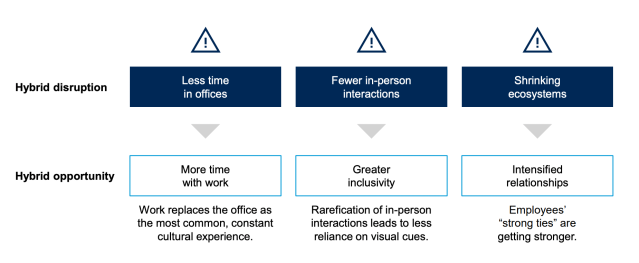
The rise of micro-cultures in the hybrid workplace is causing a crisis of confidence in the public sector, but human resource experts say it doesn’t have to.

Director of Gartner’s Human Resources Advisory Group, Neal Woolrich, describes ‘microculture’ as a sense of identity, purpose and community existing among subsets of people within an organisation.
“We typically recognise micro-cultures where teams choose the norms and behaviours that apply best to them in their specific work context,” he tells Government News.
Often, they tend to arise in organisations that value individualisation rather than compliance, but their recent emergence has been one of the by-products of the post-pandemic shift to work-from-home.
The new challenge of hybrid work
Mr Woolrich says while the administrative and logistical challenges associated with hybrid work have been largely addressed, managers are now facing new and more complex culture-related issues.
Pre-pandemic, the office was the central hub for communications and workplace culture, with physical proximity favouring a top-down leadership model.
According to Gartner’s Culture in a Hybrid World report, which surveyed 6,758 knowledge workers across the globe, the post pandemic cultural experience is characterised by
- fewer in-person interactions
- less time in the office
- shrinking ecosystems, or fewer interactions with ‘weak ties’
The survey also found that for most employees, team members are the only people they interact with several times a day.
Turning toxic
The hybrid environment has dissolved the top-down model, Mr Woolrich says, and replaced it with the new workplace micro-cultures.
“The impact of hybrid work means many employees are spending more time with their direct team members and managers, and less time with those outside of these groups,” he says.
“While this isn’t necessarily a bad thing, it can lead to a lack of diversity of thinking and the setting of disparate goals or objectives.”
Poorly managed, micro-cultures can become exclusionary, toxic and clique-like, and Mr Woolrich says it’s up to managers and HR practitioners to make sure things don’t head in that direction.
Research by Gartner has found that only one in four hybrid or remote knowledge workers are connected to their organisational culture, something senior leaders tend to blame on lack of office time.
However, the research indicates the same applies to on-site employees.
Only 17 per cent of on-site workers are culturally connected, compared to 25 per cent of hybrid workers and 24 per cent of remote workers.

Strengthening connections
The trick to surviving and thriving amid the cultural change taking place in the public sector is for managers to recognise the benefits of micro-cultures and make sure they work for the organisation, Mr Woolrich says.
One of the benefits of is that micro-cultures can actually strengthen connectedness and bind teams more closely together. This effect can be harnessed and leveraged in a number of ways, including reducing the reliance on contractors and improving out-of-office responsiveness.
If deployed and harnessed by HR practitioners, the development of microcultures can be a point of growth and a tool for success.
Neal Woolrich
“Public servants will not be returning to the office full-time soon,” Mr Woolrich says.
“Management needs to understand this and improve communication and knowledge-sharing to make sure that all teams are equipped to get the job done, no matter which desk they’re working from.
“If deployed and harnessed by HR practitioners, the development of micro-cultures can be a point of growth and a tool for success.”
Comment below to have your say on this story.
If you have a news story or tip-off, get in touch at editorial@governmentnews.com.au.
Sign up to the Government News newsletter